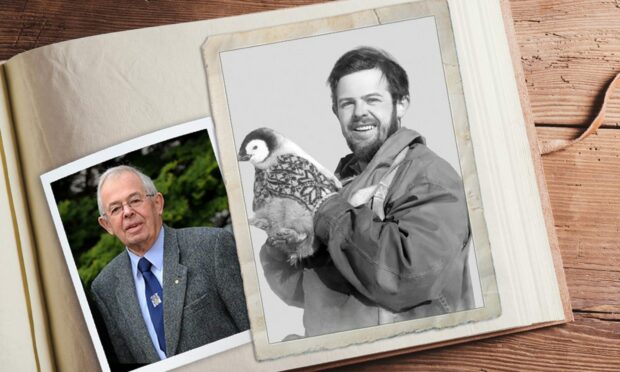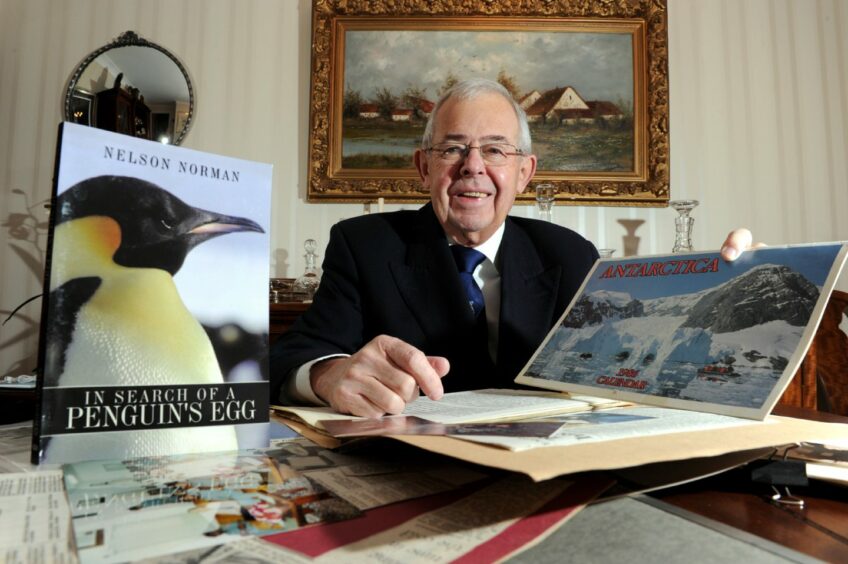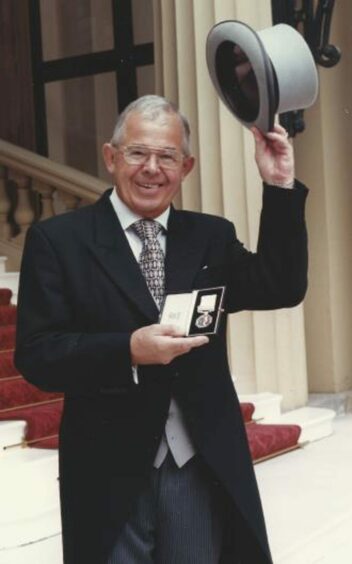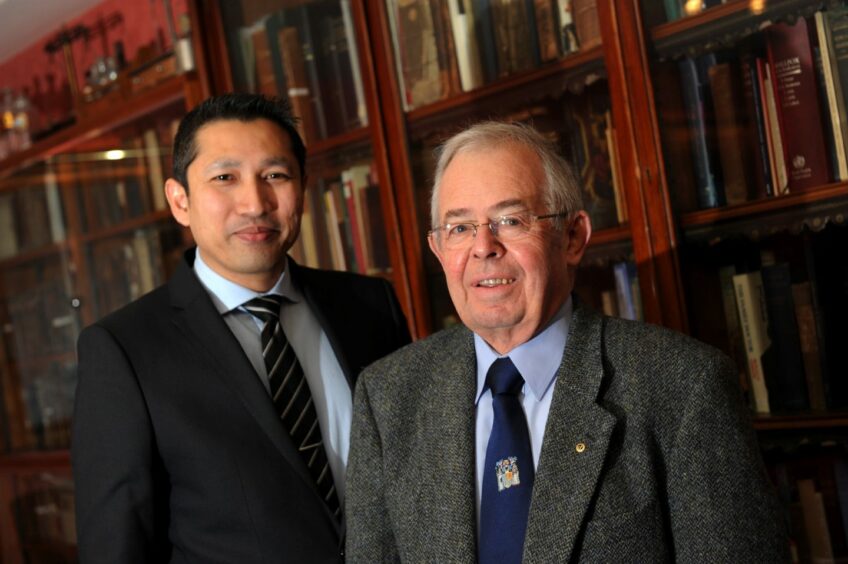Pioneer of remote healthcare, Antarctic adventurer, grandfather, husband, dad and medic, Aberdeen professor John Nelson Norman has died aged 90.
Surgeon inspired medical career
John Nelson Norman, always known as Nelson, was born in Paisley in May 1932. His father, Alexander Mackinnon Norman was a customs officer and his mother, Winnifred, looked after the Nelson and his younger sister, Margaret.
Nelson’s first memories were of life in Campbeltown where his father worked auditing the local distilleries.
They returned to Paisley in 1938 where Nelson attended Paisley Grammar School. He excelled in English and history and met his lifelong friend, David Campbell.
In 1945, age 13, Nelson spent seven weeks in hospital due to appendicitis. Perhaps due to how much he revered his surgeon, Robert Mailer, Nelson followed a path towards medicine and qualified in 1957.
Unexpected Antarctic adventure
Following on from a hospital residency he and David completed two years’ National Service in the army as medical officers.
During his service an opportunity arose for volunteers to travel to the Falkland Islands Dependency. Keen to go somewhere near South America Nelson signed up but soon discovered that Falkland Islands Dependency actually meant Antarctica.
Undaunted, he set sail and chronicled the year-long trip in a book he wrote and published in 2009, In Search of a Penguin’s Egg.
In recognition of this expedition, he received the Polar Medal from the Queen.
Finding facts, and love, in Glasgow
After returning from the Antarctic, Nelson continued his research at the Medical Research Council in London. A year later he moved to Glasgow as a research fellow to Sir Charles Illingworth, under the guidance of George Smith.
The research in Glasgow focused on the use of hyperbaric oxygen in medicine. The findings would later form the subject matter of Nelson’s PhD thesis.
Nelson became great friends with his Glasgow colleague Iain Ledingham. They shared accommodation and their scientific collaboration continued over many years, including a period in the 1990s when they both lived and worked in the United Arab Emirates.
In 1963 Iain and his fiancée, Eileen, were preparing for their upcoming wedding. Nelson fell for Eileen’s elder sister, Morag. He quickly summoned the courage to ask her out and by the time the newlyweds set off on honeymoon, Nelson and Morag had fallen in love. Nelson arranged a day-trip to the Isle of Cumbrae and proposed at a scenic picnic area at Fintry Bay.
Aberdeen beckoned
Nelson and Morag married in Glasgow University Chapel in July 1964.
Later that year, after George Smith was invited to take up the position of Regius Chair at Aberdeen University, Nelson followed him to Aberdeen as a lecturer in surgical science, and he began surgical training.
The new Mr and Mrs Norman set up home in Airyhall. In December 1967 their daughter Sarah-Jane was born.
That same year Nelson became a fellow of the Royal Colleges of Physicians and Surgeons of Glasgow and Edinburgh. Over the next few years he was active in academic surgery, supervising young surgeons.
In the 1970s the Norman family moved to Cairnlee Park in Bieldside where they formed lifelong friendships with their neighbours. It was around the same time oil and gas exploration in the North Sea increased.
Challenging conditions
It was apparent that the hostility of the North Sea would create as daunting and as remote a healthcare setting as could be imagined.
Nelson loved a challenge and quickly immersed himself in various areas of medicine including saturation diving, surviving in extreme cold, to providing medical attention in an offshore setting.
He established the Institute of Environmental and Offshore Medicine at Aberdeen University and by 1976, the university had appointed Nelson chair of environmental medicine.
Over the following years, Nelson was at the forefront of many advances in medical support in the offshore industry. He was also at the heart of efforts to establish remote healthcare organisations, and the formation of a research facility on Mount Morrone, near Braemar.
Antarctic unit opened in Aberdeen
Nelson and his family moved from Bieldside to Newhills House in the early 1980s and holidayed in Menorca where they owned a villa. He also switched from Aberdeen University to Robert Gordon Institute of Technology (RGIT), establishing the Centre for Offshore Health at Kepplestone mansion, and subsequently merging with the Offshore Survival Centre in King Street.
The system of medicine pioneered by Nelson during his time at the university and RGIT was introduced to the British Antarctic Survey. Nelson established the British Antarctic Survey Medical Unit based in Aberdeen and became its first director.
Another house move took the Normans to Morningfield Road in Aberdeen where Honey and Poppy – two retrievers – were welcomed to the family.
In 1991, Sarah-Jane married Bruce Mackie. They moved to Houston and in 1993 Nelson and Morag became grandparents when Scott Alexander Mackie was born.
‘Father of remote healthcare’
Shortly after Bruce and Sarah-Jane moved to Houston, Nelson and Morag embarked on their own adventure overseas. In 1994, Nelson took up the position of professor of community medicine in Al Ain, United Arab Emirates.
After five years, Nelson’s spell at the University of Al Ain ended. He and Morag returned to Aberdeen where Nelson continued his work on remote healthcare.
Alongside Alan Bolam, the Institute for Remote Healthcare (IRHC) was born and for 10 years they regularly travelled to various countries as its directors.
Nelson received a lifetime achievement for his work as “the father of remote healthcare” in 2015.
‘Off to Valhalla’
He spent his later years with Morag at Rubislaw Park Road. They shared 57 years together before Morag died in November 2021.
Nelson celebrated his 90th birthday in May and despite his own deteriorating mobility, he still harboured many grand plans and dreams including one more trip to the Middle East.
Nelson wasn’t afraid of dying, announcing recently: “That’s me contented now. I am happy that I am lovingly cared for and have a wonderful family with me. I can ride off to Valhalla in good spirits”.
Grandson’s tribute
John Nelson Norman died on September 27.
At his funeral, Scott paid tribute to his grandfather reading from the final paragraph of Apsley Cherry-Garrard’s book The Worst Journey in the World. The words, which Nelson had requested, articulated his own experience of being in Antarctica.
He read: “And I tell you, if you have the desire for knowledge and the power to give it physical expression, go out and explore. If you are a brave man you will do nothing: if you are fearful you may do much, for none but cowards have need to prove their bravery.
“Some will tell you that you are mad, and nearly all will say: ‘What is the use?’ For we are a nation of shopkeepers, and no shopkeeper will look at research which does not promise him a financial return within a year. And so you will sledge nearly alone, but those with whom you sledge will not be shopkeepers: that is worth a good deal. If you march your winter journeys you will have your reward, so long as all you want is a penguin’s egg.”




Conversation